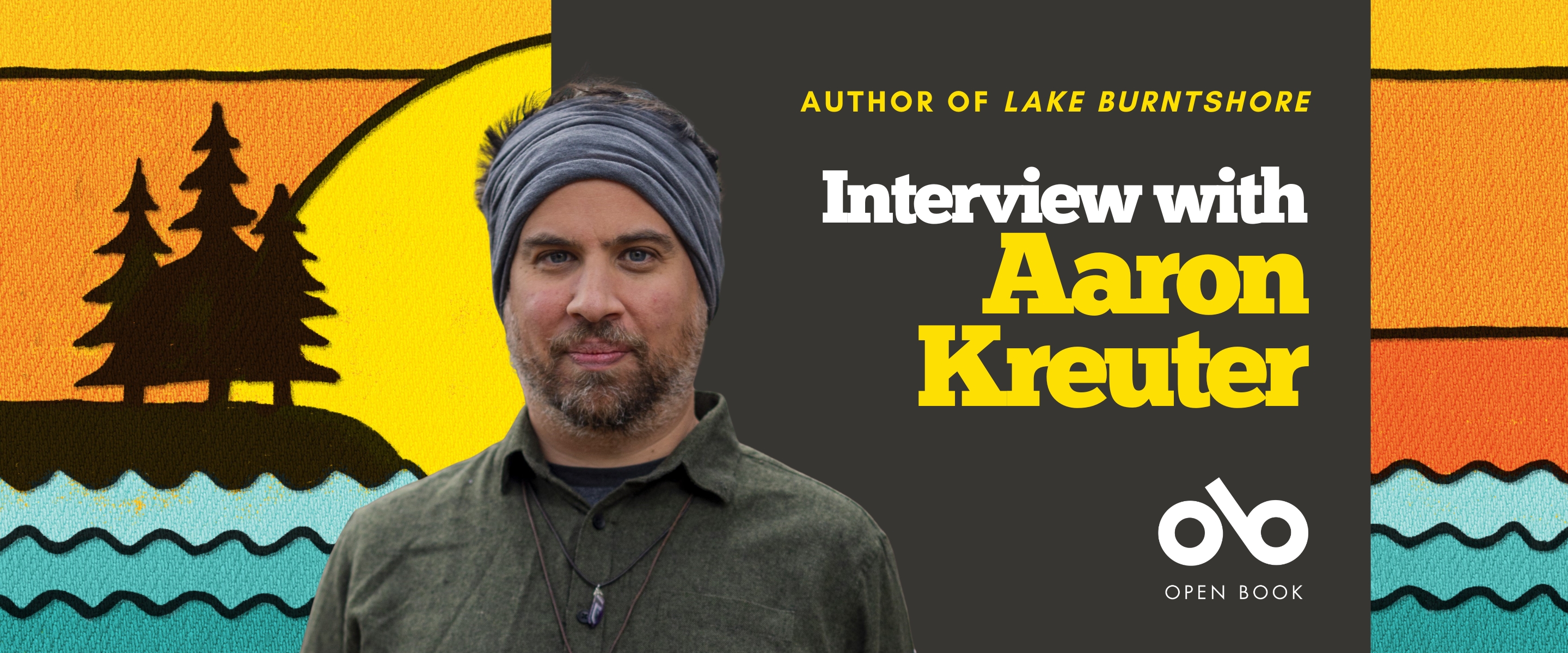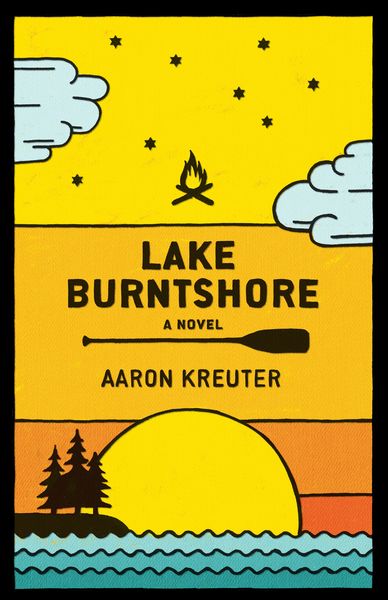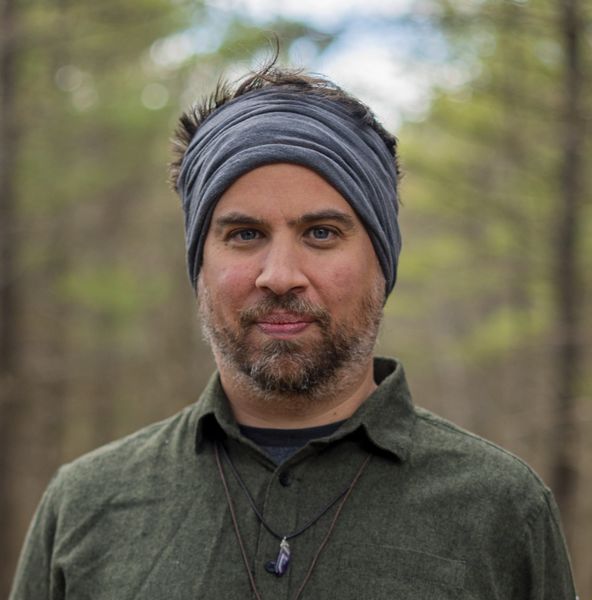A Young Camp Counselor Fights to Protect the Integrity of a Beloved Summer Tradition in Lake Burntshore
With his poetry appearing on a number of prestigious shortlists, including the Governor General's Literary Award, the Vine Awards, and the ReLit Awards, Aaron Kreuter has built a steller reputation for his lyrical skills. Now he's turned his pen to prose, with a much anticipated debut novel.
In Lake Burntshore (ECW Press), Kreuter takes readers back a decade to 2013, where 21-year-old Ruby has a summer gig at Camp Burntshore. It seems a simple enough task to supervise the rowdy young people at this Jewish sleepover camp by day, and smoke weed by the fire with her peers by night, but things become far more complicated when the camp owner's son brings in Israeli soldiers to shore up the staff. He's also intent on buying Crown land around the lake, which is on the rightful territory of the Black Spruce First Nation.
Driven to action by her anti-Zionist and anti-colonial views, Ruby finds herself at loggerheads with these changes at the camp, and has to juggle routine daily happenings with her feelings for another counselor and her efforts to save the Burntshore from a slide into greed and corruption. Lake Burntshore is a celebration of the complexity of the modern Jewish world, and a poignant story centered around a beloved summer tradition.
Open Book:
Do you remember how your first started this novel or the very first bit of writing you did for it?
Aaron Kreuter:
I’ve wanted to write a novel set at Jewish summer camp since I was sixteen, literally at camp. My first attempt was shortly after that, I wrote maybe twenty or thirty pages—they’re gone now, so it’s hard to say. I showed them to my mom’s friend who was a published author; she was quite supportive, though I imagine the pages were bad. If I remember correctly, it was all set up, what an old professor of mine would have called “throat-clearing”: I never got far enough into the project for something to happen. After that, the novel lived rent-free in my head for nearly twenty years, but besides filling a dedicated notebook, there was no more attempts at actual writing the novel—or any novel, for that matter—until I was at the Banff Centre in 2018, working on finishing the stories that would become my collection Rubble Children. I very clearly remember opening a new document, and writing the scene that now opens the novel, of Yonatan arriving in May and starting to prep for the camp for the coming summer. With that scene, which basically just slipped out when I least expected it, I was on my way.
OB:
How did you choose the setting of your novel? What connection, if any, did you have to the setting when you began writing?
AK:
For Lake Burntshore, the novel very much is the setting. The name of the (fictional) lake is right there in the title, and creating and imagining the shoreline, the buildings, the trails, the history, the people, the secrets, was an important part of the writing process. This is the first of my books to have a map, and it doesn’t only have one, it has two! The so-called province of Ontario has 250,000 lakes, and hundreds of them have sleepover camps of some kind on them, with dozens of those being Jewish, whether secular, religious, rightwing, progressive, Zionist, or in name only. The novel’s own Camp Burntshore starts off on the secular side of the scale, but with the arrival of Israeli soldiers as staff who knows where it’ll be by summer’s end. Lake Burntshore’s geography also includes the Black Spruce Anishinaabe reserve (where head chef Cyndy and other characters live), the small town of Spitsville (named after the town’s founder, Holleander Spitz), vast tracts of Crown land, named and unnamed islands, the White Pine River, and on the north side the black sand beaches which give the lake, and the camp, its name. As a Jewish settler, I have always been drawn to the more treed parts of Ontario, to the Anishinaabe land of rivers and lakes and forests and trails and shorelines. Part of the impetus behind the novel was to explore ways to relate to that land, not through the violent power of the settler, but through the diasporic respect of a visitor, of a guest bound by treaties. Throw in the Israeli soldiers whose arrival at camp perpetuates a crisis of Jewish identity for the characters, and this one summer at a fictional camp on the shores of a fictional lake will hopefully allow readers to grapple with settler colonialism here, in Canada, and there, in Israel/Palestine. In a very real sense, the setting, the narrative, the novel, it all comes down to the land.
OB:
Did you find yourself having a "favourite" amongst your characters? If so, who was it and why?
AK:
In a novel with, I’ll admit, a pretty wide cast of characters, my favourite shifts from day to day. Is it Brett, heir apparent to the camp, so obsessed with Zionism and the Jewish need for more and more land that he’s willing to go to any lengths to change Camp Burntshore forever? Is it Ayelet Cho, the sixteen-year old Counselor In Training, who is entering the worlds of sex, power, and politics for the first time? Is it one of the (many) guitar players in the novel—Tyler, troubadour songwriter performer extraordinaire? Simon, head of ropes, spending his days high in the trees and his nights jamming at the ski-docks, high? Vlada, first year staff, blowing everybody at the ski-docks away with her phrasing, chops, and sense of rhythm? Maybe it’s Tova, the head tripper, competent, collected, teaching her young charges the history of the land, Tova who will always have a special place in my canoe-crazed heart. Maybe it’s one of the Israeli soldiers who show up at camp, bringing their own ideologies and baggage with them. Maybe it’s Tom, the camp owner, a retired pharmacist now geologist. Maybe it’s Geoff, the Anishinaabe kitchen worker from the reserve next door. Most days, it ends up being Ruby, the protagonist. It is undoubtedly her novel in many ways. Her anger and disgust when Brett convinces Tom to hire Israeli soldiers as staff, her growing feelings for one of those soldiers, Etai, who has served jail time for refusing to serve in the Occupied Territories. Though Ruby doesn’t exactly engender the novel’s conflicts—the soldiers and how they will forever change the texture of Camp Burntshore, Brett’s plans to buy the ten thousand acres of Crown land, which by right belongs to the Black Spruce First Nation—it is Ruby’s reactions to these events, and her attempt to fight back, that are the heart and soul of the book.
Your CanLit News
Subscribe to Open Book’s newsletter to get local book events, literary content, writing tips, and more in your inbox
OB:
Did you do any specific research for this novel? Tell us a bit about that process.
AK:
I read novels about Jewish summer camp. I read memoirs about Jewish summer camp. I read academic studies about Jewish summer camp (on Jewish identity at camp, on Israeli soldiers at camp, on Hebrew language as indoctrinating device at camp). I spoke to friends and family. I scoured the internet. I eavesdropped. I plumbed my conscious and unconscious mind. I read about the history of settler colonialism on the Anishinaabe lands of Ontario, the history of the Temagami canoeing region. I spoke to a lawyer who specializes in Indigenous land claims. I combed through my own journals from my time as a camper and counselor, looking for that one image or idea out of all that adolescent chaff. I looked up what the tableau of roots, rocks and dirt from a tipped over tree is called (a rootwad). I measured on Google maps how long it is from the Thornhill intersection of Centre and Bathurst to Lake Ontario (around twenty kilometers). I researched the names and histories of the Toronto Chinese daily newspapers. I tried to find when the phrase “zero fucks to give” became popular. I spent far too long researching the parts and names of a car wash for one little simile.
OB:
What was the strangest or most memorable moment or experience during the writing process for you?
AK:
That thing when you’re working on a novel and you’re deep into it and you can barely think of anything else and every single aspect of your life whether you like it or not starts orbiting around the novel. Sometimes it’s called novel vision. In the jamband world it would be called hosing. Really, it’s about being plugged in. Just that state of being where everything you hear, see, think, or feel seems to have a place in the novel. Either that, or the moment I realized that, from nothing, I had created an entire living, breathing world.
OB:
Did you celebrate finishing your final draft or any other milestones during the writing process? If so, how?
AK:
I believe very strongly in the need to celebrate all writing milestones. Finishing a draft, for sure. Nailing a scene, for sure. Staring at the computer screen for three hours before writing one sentence, oh most definitely. Those are the moments that should be celebrated the most, no matter how terrible the sentence. Actually, the terrible sentences should be celebrated most of all: with every terrible sentence, you are that much closer to the sentences that sing, that delight, that undermine, that surprise.
OB:
What if, anything, did you learn from writing this novel?
AK:
Each of my books has changed me, but the writing of Lake Burntshore has changed me more than the others. This is not just because of the fact that it’s the first novel I’ve written, though that’s definitely important. I think it has to do with the creation of an entire enclosed community, a community that, though it only exists for two months of the year, feels real, feels lived in. I deeply believe in the power of fiction to have an impact on the world, to celebrate, to satirize and critique, to imagine better, to force us to refocus. Writing through the momentous summer of Camp Burntshore 2013 showed me, more than ever before, how powerful it can truly be.
_________________________________
Aaron Kreuter is the author of five books, including the poetry collection Shifting Baseline Syndrome, a 2022 finalist for the Governor General’s Literary Award. His work has been shortlisted for two Vine Awards for Jewish Literature, a Raymond Souster Award, and a ReLit Award. He lives in Toronto.







